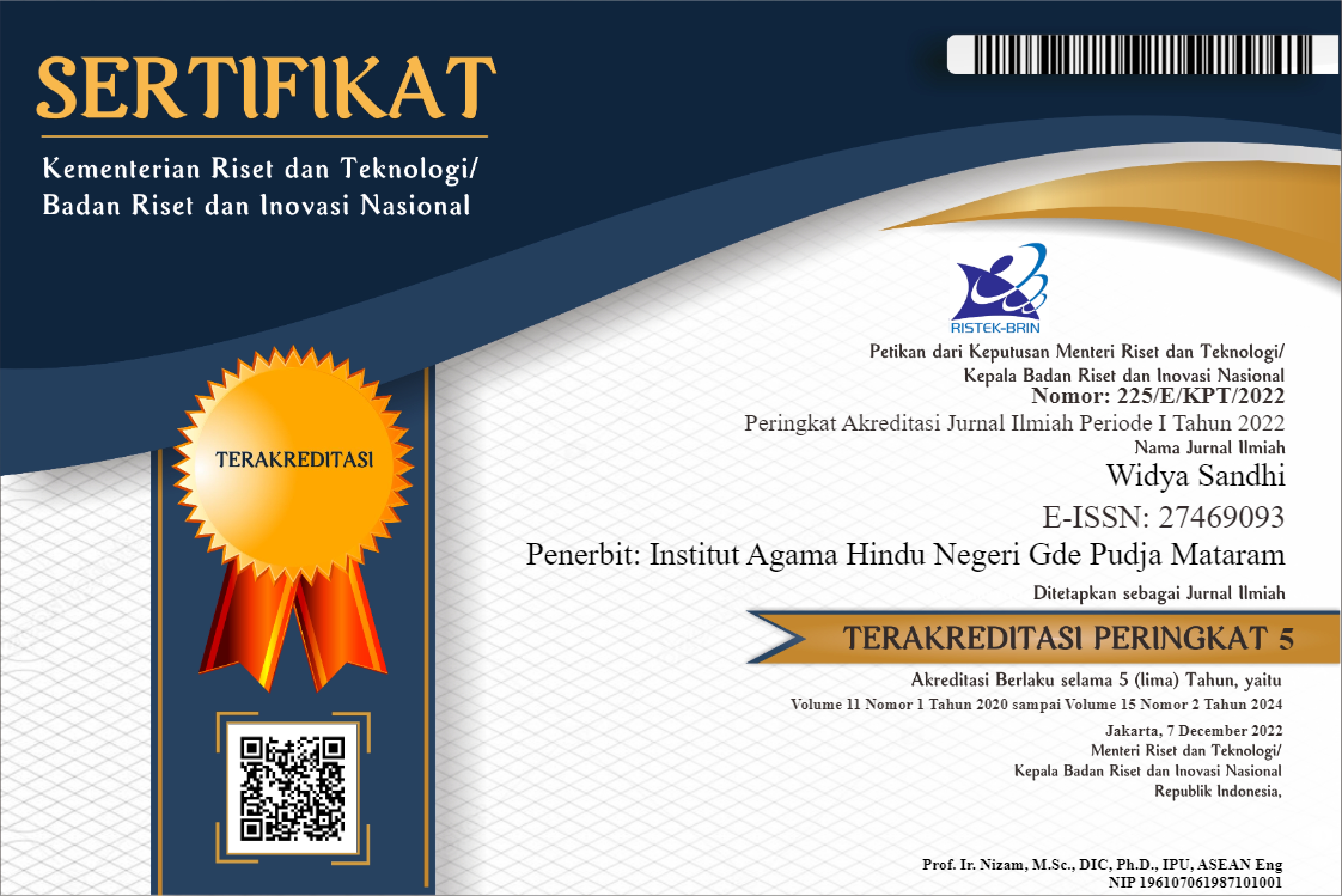Kampung Pakelan: Khazanah Toleransi Antarumat Beragama dan Kepercayaan di Kota Kediri
Abstract
This research highlights the importance of understanding the local context in analyzing diversity and tolerance. Pakelan can already be said to be a village that meets the criteria of a miniature Indonesian state de jure and de facto. By using a phenomenological approach, this article aims to explore and portray the face of tolerance between religious communities and beliefs. The results of this research are first, the face of tolerance is attached to several activities in the form of ideas, ideas, and social activities, which manifest in the context of houses of worship, gametan, sacrifice, PHBA and so on. The conclusion of this research is that tolerance is not a static condition. The condition of tolerance and intolerance needs to be placed in a broader spectrum. A region can have a more tolerant character than other regions, but because no region is fully tolerant or intolerant, the position in the spectrum can change along with socio-political changes. The terms tolerance and intolerance should not be interpreted narrowly, only related to religious theological views. The theological orientation that exists in Pakelan does not necessarily prevent religious adherents and believers from coexisting with each other. Tolerance is a multidimensional condition, which is related to value, social and structural aspects.
References
Abror, Mhd. “Moderasi Beragama Dalam Bingkai Toleransi.” Rusydiah: Jurnal Pemikiran Islam 1, no. 2 (2020): 143–55.
Adian, Donny Gahral. Demokrasi Substansial: Risalah Kebangkrutan Liberalisme. Penerbit Koekoesan, 2010.
Alamin, Taufik, Darsono Wisadirana, Sanggar Kanto, Hilmy Mochtar, Sholih Mu’adi, and Mardiyono Mardiyono. “Political Change Patterns of The Mataraman Society in Kediri.” Journal of Development Research 4, no. 2 (2020): 106–14.
Alniezar, Fariz. Homo Homini Humor. BASABASI, 2019.
Anam, Wahidul, and dkk. Potret Kerukunan Umat Beragama Di Kota Kediri. Kediri: IAIN Kediri Press, 2021.
Devi, Dwi Ananta. Toleransi Beragama. Alprin, 2020.
Ferdian, Ferdi. “Fungsi Forum Kerukunan Umat Beragama (FKUB) Dalam Sistem Sosial Penciptaan Kerukunan Umat Beragama Di Kabupaten Pasaman Barat.” Islam Realitas: Journal of Islamic and Social Studies 4, no. 2 (2018): 136–47.
Fitriani, Shofiah. “Keberagaman Dan Toleransi Antar Umat Beragama.” Analisis: Jurnal Studi Keislaman 20, no. 2 (2020): 179–92.
Hamdi, Ahmad Zainul, Zumrotul Mukaffa, and Lia Hilyatul Masrifah. “Gerakan Radikalisme Di Kampus-Kampus Dan Pusat Kajian Keagamaan Di Perkotaan Di Jawa Timur,” 2019.
Hanani, Silfia. Menggali Interelasi Sosiologi, Dan Agama. Bandung: Humaniora, 2012.
Hidayatullah, Fauzan. “Analisis Pandangan Abdul Moqsith Ghazali Dan Hamid Fahmy Zarkasyi Terhadap Pluralisme Agama Dalam Penafsiran Ayat-Ayat Al-Quran.” Jurnal Pemikiran Islam 3, no. 1 (2023): 28. https://doi.org/10.22373/jpi.v3i1.16858.
Huda, Hisbulloh. “Pluralisme Quranik Perspektif Hamka.” Institut PTIQ Jakarta, 2022.
Institut, Setara. “Ringkasan Eksekutif Indeks Kota Toleran,” 2021.
Jufri, Muwaffiq. Metode Penyelesaian Konflik Agama: Optik Hukum, HAM, Dan Nilai Kearifan Lokal. Scopindo Media Pustaka, 2021.
Khusna, Nurul. Jean Paul Sartre: Filsuf Eksistensialisme Imajinatif. Anak Hebat Indonesia, 2017.
Nugraha, Y D. “The Moderating Role of Gender and Religiosity on the EMA Model: An Indonesian Muslim Pilgrim Perspective.” Journal of Islamic Marketing 13, no. 6 (2022): 1201–23. https://doi.org/10.1108/JIMA-03-2020-0076.
Nur, Hasan Basri M, Syed Sultan Bee Packeer Mohamed, and Nor Azlah Sham Rambely. “The Existence Of Minorities In The Specificity Of Islamic Syiar In Aceh, Indonesia.” Jurnal Al-Bayan: Media Kajian Dan Pengembangan Ilmu Dakwah 26, no. 2 (2021): 185–215.
Nusyur, Raihan. “Jurnalisme Damai Dalam Pemberitaan Pembakaran Gereja Di Aceh Singkil Pada Harian Waspada.” Jurnal Komunikasi Global 6, no. 1 (2017): 26–38.
Pals, Daniel L. “Seven Theories of Religion: Tujuah Teori Agama Paling Komprehensif, Terj.” In Inyiak Ridwan Muzir. Yogyakarta: IRCiSoD, 1996.
Paratanto, Pius A. “Kamus Ilmiah Populer.” Surabaya: Arkola, 2001.
Puspitosari, Wida Ayu. “Etnis Tionghoa, Tahu Dan Kota (Terbangunnya Identitas Kota Kediri),” 2012.
Putra, Adi. “Persekusi Terhadap Gereja,” 2021.
Radarkediri.jawapos.com. “Melongok Kerukunan Antarumat Dan Antaretnis Ala Kelurahan Pakelan,” 2022.
Retnowati. “Agama, Konflik Dan Integrasi Sosial Refleksi Kehidupan Beragama Di Indonesia: Belajar Dari Komunitas Situbondo Membangun Integrasi Pasca Konflik”.” Jurnal Sangkep 1, no. 1 (2018).
Robertson, Roland. “Sociology of Religion, Terj. Ahmad Fatawi Dan Saifuddin.” edited by Ronald Robertson. Jakarta, 1988.
Rosdiawan, Ridwan. War on Terror. IAIN Pontanak Press, 2022.
Solikin, Nur. “Agama & Problem Mondial.” STAIN Jember Press, 2013.
Sutami, Hermina. Tim Redaksi Kamus Besar Bahasa Indonesia Pusat Bahasa, Kamus Besar Bahasa Indonesia Pusat Bahasa; Edisi Keempat. Jakarta: Gramedia Pustaka Utama, 2008, 1701 Pp. [First Edition: Kamus Besar Bahasa Indonesia, Jakarta: Balai Pustaka, 1988.] ISBN 978-979-22-3. Vol. 11. Wacana Journal of the Humanities of Indonesia, 2009. https://doi.org/10.17510/wjhi.v11i2.165.
Turmudi, Endang. Merajut Harmoni, Membangun Bangsa: Memahami Konflik Dalam Masyarakat Indonesia. Yayasan Pustaka Obor Indonesia, 2021.
Wach, Joachim. “Ilmu Perbandingan Agama Inti Dan Bentuk Pengalaman Keagamaan.” Jakarta: PT. Rajagrafindo Persada, 1996.

This work is licensed under a Creative Commons Attribution-NonCommercial-ShareAlike 4.0 International License.
Authors who publish with this journal agree to the following terms:
- Authors retain copyright and grant the journal right of first publication with the work simultaneously licensed under a Creative Commons Attribution-ShareAlike 4.0 International License. that allows others to share the work with an acknowledgment of the work's authorship and initial publication in this journal.
- Authors are able to enter into separate, additional contractual arrangements for the non-exclusive distribution of the journal's published version of the work (e.g., post it to an institutional repository or publish it in a book), with an acknowledgment of its initial publication in this journal.
- Authors are permitted and encouraged to post their work online (e.g., in institutional repositories or on their website) prior to and during the submission process, as it can lead to productive exchanges, as well as earlier and greater citation of published work (See The Effect of Open Access).






.jpg)




